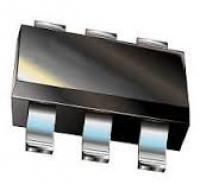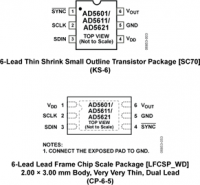| Analog Devices, Inc. |
Electronics Integrated Circuits Product Number : AD5641BKSZ-500RL7DKR-ND
Integrated Circuits (ICs)6-lead SC70 and LFCSP packages Micropower operation: 100 μA maximum at 5 V Power-down typically to 0.2 μA at 3 V 2.7 V to 5.5 V power supply Guaranteed monotonic by design
The AD5641, a member of the nanoDAC® family, is a single, 14-bit, buffered, voltage-out DAC that operates from a single 2.7 V to 5.5 V supply, typically consuming 75 µA at 5 V. The part comes in tiny LFCSP and SC70 packages. Its on-chip precision output amplifier allows rail-to-rail output swing to be achieved. The AD5641 uses a versatile 3-wire serial interface that operates at clock rates up to 30 MHz and is compatible with SPI®, QSPI™, MICROWIRE™, and DSP interface standards. The reference for AD5641 is derived from the power supply inputs and, therefore, gives the widest dynamic output range. The part incorporates a power-on reset circuit, which ensures that the DAC output powers up to 0 V and remains there until a valid write to the device takes place. The AD5641 contains a power-down feature that reduces current consumption typically to 0.2 µA at 3 V, and provides software-selectable output loads while in power-down mode. The part is put into power-down mode over the serial interface. The low power consumption of the part in normal operation makes it ideally suited to portable battery-operated equipment. The combination of small package and low power makes this nanoDAC device ideal for level-setting requirements such as generating bias or control voltages in space-constrained and power-sensitive applications.

ELECTRONICS - INTEGRATED CIRCUITS

Properties : 6-lead SC70 and LFCS,Micropower operation,Guaranteed monotonic
Application : Voltage level settin,Portable battery-pow,Digital gain and off,Programmable attenua,Programmable voltage

ELECTRONICS - INTEGRATED CIRCUITS

Properties : 6-lead SC70 and LFCS,Micropower operation,Power-down typically
Application : Voltage level settin,Digital gain and off,Portable battery-pow,Programmable voltage,Programmable attenua